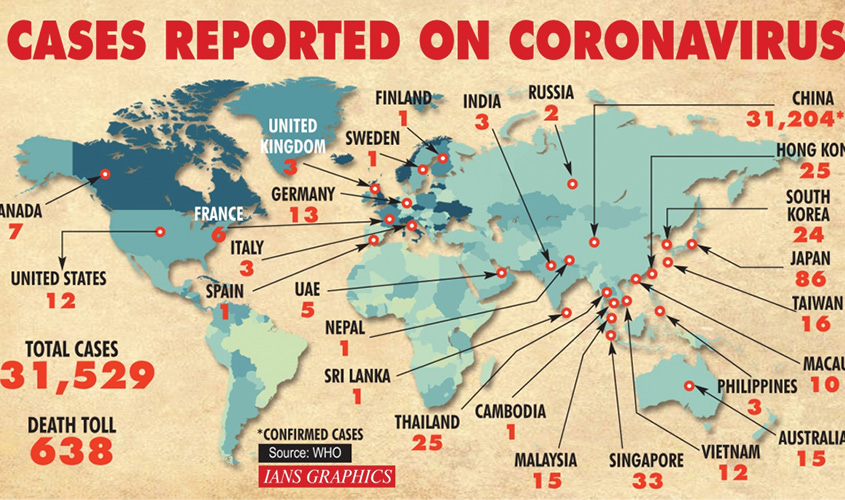Indian consumers of electronics will feel the pinch; the crisis is bound to accelerate the ‘Shift Factories Out Of China’ discourse.
There are jitters being felt around the world as the world’s second largest economy struggles to contain the epidemic of the deadly novel coronavirus, with growth forecasts for Chinese economy being slashed from 5.75% to 5% (Reserve Bank of Australia forecast). The virus is causing anxiety in economies from the United States to Germany to Australia to India about the impact—from raw materials being in short supply to fall in exports to dip in tourists to fall in number of Chinese overseas students. And since China runs a trade surplus against major economies—like US and India—it is bound to have a larger impact on both trade and domestic industry. Obviously, sectors that rely heavily on Chinese imports of raw materials will feel the pinch more than others. India’s exports to China stood at $16.8 billion for FY19, while imports stood at $70.3 billion indicating the impact that coronavirus will have on Indian industry.
Specifically, pharmaceuticals, mobiles, electronics, automobiles are some of the sectors that will bear the brunt of a shutdown in Chinese factories, impacting the supply of raw materials. China is a big global supplier of television panels, LED chips, compressors for refrigerators and air-conditioners, motors etc. Prices of these products will, in all likelihood, increase if the supply disruption continues for long.
The situation is bleak for India’s handset industry, which is the second largest in the world and next only to China. It is the star in the Government’s Make in India program and will soon start feeling the pinch of shuttered Chinese factories. With Chinese components unlikely to start arriving soon some say the industry is just days away from serious trouble due to very low raw material inventory available. With 268 mobile manufacturing units in India, India’s mobile exports will be seriously impacted due to large scale supply chain disruption.
It’s a similar story for auto companies as well as component makers which are getting impacted due to disruption in supply of parts. And while in value terms the Chinese components for Indian auto makers may be small, even a single part can cause delay in rolling out the product. So while Maruti Suzuki is on record saying the percentage of imports of the company and its vendors from China is “not a large amount”, a single part can delay and disrupt the entire delivery schedule of an automobile. And that’s the big challenge. Tata Motors has already said the epidemic could impact production for its luxury brand Jaguar Land Rover.
While these are sectors that get impacted due to delays in imports of raw materials from China, Indian exports to China will also be hit significantly for rubber, spices, seafood and diamond.
Essentially, like all economies, India will be hurt, with sectors having larger exposure to China bearing the brunt of it. And if these disruptions continue for long, it will lead to substantial price increases as well as is the case in pharmaceuticals where active pharmaceutical ingredients (APIs) for antibiotics and anti-inflammatory drugs have skyrocketed and is set to increase further if delays continue.
But long term disruption would also lead to pressures on companies to shift supply lines out of China. This pressure has been there since the US-China trade war started from 2018 and escalated further in 2019 and companies have been examining the possibility of creating alternate supply lines. In the last one year, both the US and China have imposed massive duties on each other’s goods, impacting businesses around the world. Though both sides have now reversed some of the duty hikes, the impact on bilateral and global trade has been significant and will take time to reverse.
The need for reducing “China exposure” is being felt by companies around the world and a prolonged shutdown of Chinese factories and hence the global supply chain due to the epidemic will give further push to this thought. Of course shifting supply chains will be a protracted, painful exercise, but large corporates will look to now reduce their dependence on China.
US President Donald Trump is already viewing the outbreak as a once-in-a-lifetime opportunity to slow China’s rise with his comment that the outbreak would “have a good ending for us” and Commerce Secretary Wilbur Ross claiming the pandemic will bring back jobs to the US. That’s the harsh reality of global economics. Someone’s loss will be someone’s gain. So while it is too early to say China’s misery will be India’s gain (that’s not the intent of the article either), it is pertinent to emphasise how cost and benefit analysis is done by corporates around the world. Just like it made economic sense to invest in China due to its business-friendly climate two decades ago, it is now good business acumen to create alternate supply lines to reduce China exposure. Around the world, companies factor in “country risk” when making economic projections and it is that risk which has now gone up after coronavirus and US-China trade war in quick succession.
But while this change in the companies’ strategy is expected to be a medium term impact, the immediate impact will be lower world growth. Data suggests a 1% drop in Chinese growth leads to a 2% reduction in global growth. China’s misery is everyone’s pain.

